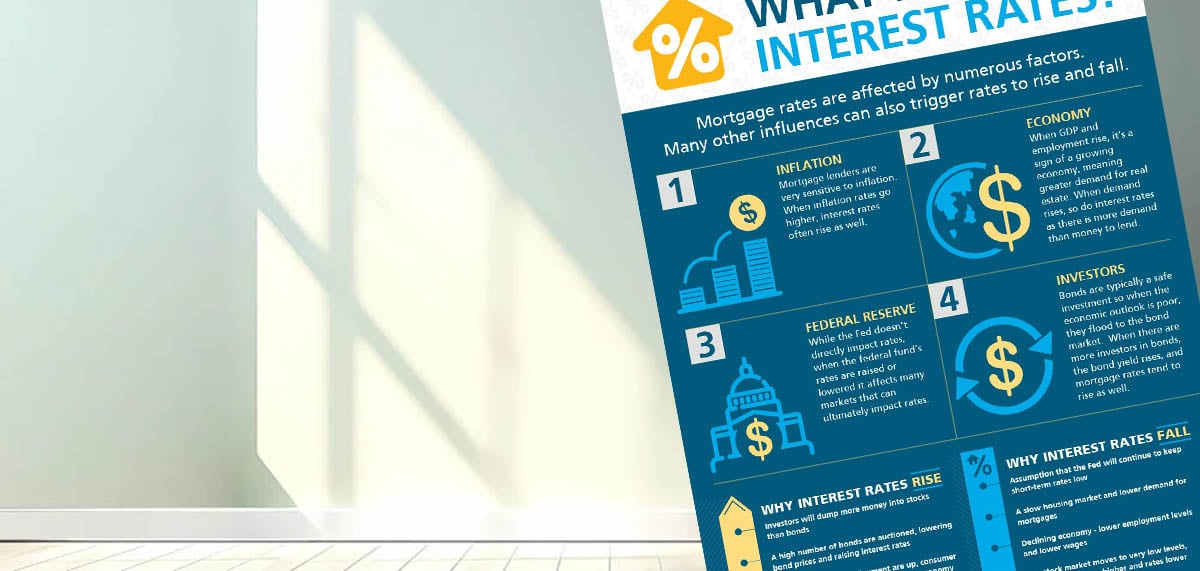Interest
Rates

The Lowdown on Rates
Finding the right interest rate for your loan is a pretty big deal—it's not just about what you pay each month but also about the long-term impact on your wallet. Getting a competitive rate can make a world of difference. Even shaving off just a fraction of a percentage point can mean keeping thousands of extra dollars in your pocket over the life of your loan, but rates are not the only thing to look at when considering your home financing. Finding the best solution that fits YOUR financial goals is most important.
So, take your time and do your homework. Explore various loan options, and don't hesitate to ask questions. By putting in the effort to compare rates, fees, and programs, you're not only making a smart financial move but also setting yourself up for a brighter financial future. After all, who doesn't want to keep more of their hard-earned cash where it belongs—in their own pocket?
What Drives Interest Rates?
National resources with a community-oriented service approach. APM maintains a national presence, but with 1,000 advisors, we pride ourselves on our local market expertise.
Is The Lowest Rate Really The Lowest?
When it comes to interest rates, what's "lowest" for one person might not be the best for you. Your financial situation, credit score, and the type of loan you're after all play into what rate you'll get. If you see ads promising rock-bottom rates, don't get too excited. There's no one-size-fits-all lowest rate out there. For instance, someone with a stellar 800 credit score and a hefty down payment might snag a different rate compared to others.
You're not just a statistic—you've got your own financial story. And there are loads of loan options tailored to different goals. So, what you'll really qualify for depends on a bunch of factors, not just what some ad claims.
What Drives Interest Rates?

Inflation
Mortgage rates are very sensitive to inflation. When inflation rates go higher, interest rates often rise as well.

Economy
When GDP and employment rise, it’s a sign of a growing economy and greater demand for real estate. When demand rises, so do interest rates as there is more demand than money to lend.

Investors
Bonds are typically a safe investment so when the economic outlook is poor, they flood to the bond market. When there are more investors in bonds, the bond yield rises, and mortgage rates tend to rise as well.

Fed. Reserve
When the Fed raises or lowers the federal fund's rates (the rate lenders charge each other), it creates a ripple effect and typically results in an impact to mortgage rates.
Not available in New York. This site is not authorized by the New York State Department of Financial Services. No mortgage solicitation activity or loan applications for properties located in the State of New York can be facilitated through this site.
Next
Not available in New York. This site is not authorized by the New York State Department of Financial Services. No mortgage solicitation activity or loan applications for properties located in the State of New York can be facilitated through this site.
Next
By giving us your phone number, American Pacific Mortgage has your consent to send you automated calls and texts to service your inquiry. By providing your phone number, you are giving permission to be contacted at that number and may Reply STOP to stop receiving messages or HELP for help. Your consent allows the use of text messages, artificial or prerecorded voice messages and automatic dialing technology for informational and account servicing. You don’t need to consent as a condition of buying any property, goods or services. Message/data rates may apply.
By entering your information and clicking “submit," you are contacting American Pacific Mortgage and agree that we may email you about your inquiry. You also agree to our Terms of Use and Privacy Policy. You may Unsubscribe at any time by replying to any e-mail from us and change the subject line to “Unsubscribe” or e-mail us at compliance@apmortgage.com to Opt out.
Submit
Someone will be in contact with you shortly.
How is your credit?
Estimating your score will not harm your credit and will help us provide a range of available rates.
By giving us your phone number, American Pacific Mortgage has your consent to send you automated calls and texts to service your inquiry. By providing your phone number, you are giving permission to be contacted at that number and may Reply STOP to stop receiving messages or HELP for help. Your consent allows the use of text messages, artificial or prerecorded voice messages and automatic dialing technology for informational and account servicing. You don’t need to consent as a condition of buying any property, goods or services. Message/data rates may apply.
Next
By entering your information and clicking “submit," you are contacting American Pacific Mortgage and agree that we may email you about your inquiry. You also agree to our Terms of Use and Privacy Policy. You may Unsubscribe at any time by replying to any e-mail from us and change the subject line to “Unsubscribe” or e-mail us at compliance@apmortgage.com to Opt out.
Submit
By giving us your phone number, American Pacific Mortgage has your consent to send you automated calls and texts to service your inquiry. By providing your phone number, you are giving permission to be contacted at that number and may Reply STOP to stop receiving messages or HELP for help. Your consent allows the use of text messages, artificial or prerecorded voice messages and automatic dialing technology for informational and account servicing. You don’t need to consent as a condition of buying any property, goods or services. Message/data rates may apply.
Next
Someone will be in contact with you shortly.
By entering your information and clicking “submit," you are contacting American Pacific Mortgage and agree that we may email you about your inquiry. You also agree to our Terms of Use and Privacy Policy. You may Unsubscribe at any time by replying to any e-mail from us and change the subject line to “Unsubscribe” or e-mail us at compliance@apmortgage.com to Opt out.
Submit
Someone will be in contact with you shortly.
Applying with
is a breeze
To begin, you will need to create a secure account.
After you’ve created an account, you will enjoy:
- Secure loan application & document exchange
- Ability to pause and resume where you left off
- Updates on your application
- Capability to e-sign documents
- Easy access to resources
Want to Learn More?
Get your hands on our full infographic that covers everything you need to know about what influences interest rates.

We're Here to Help
We have resources, tools, and advice available for you when you need it.


